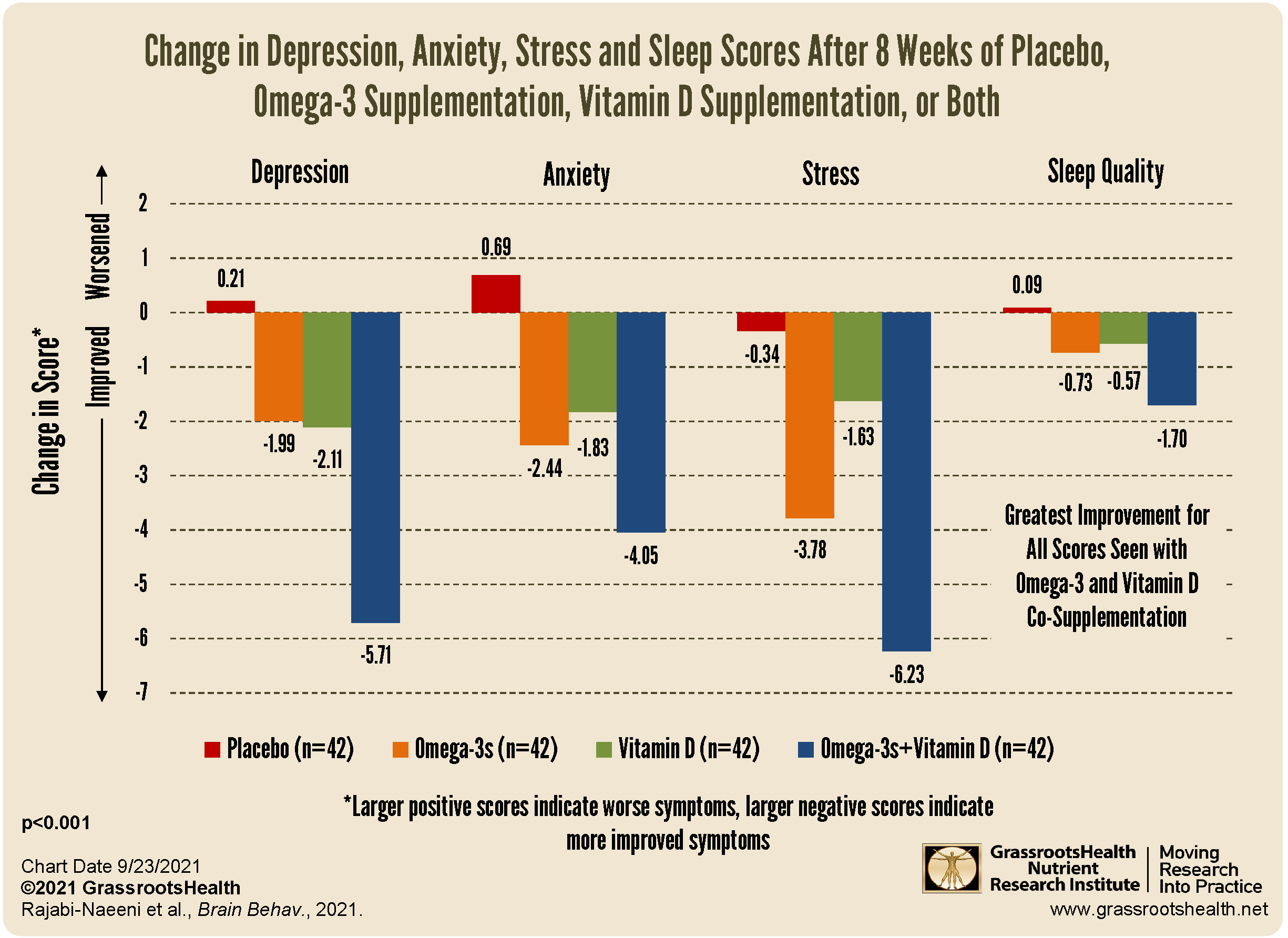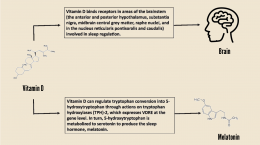Published on September 24, 2021
This randomized controlled trial offers an excellent example of how nutrients work together to provide benefits beyond taking either on its own
Key Points
- While many nutrients have very specific actions within the body, nutrients often work together (as co-nutrients) to produce specific health outcomes
- Both vitamin D and omega-3 fatty acids have been shown to benefit depression, anxiety, stress and sleep
- A recent study shows how supplementing with both vitamin D and omega-3s had a greater effect on anxiety, stress, and sleep than either on its own or placebo
 Each system within the body (such as our cardiovascular or nervous system) relies on a combination of functional processes, each of which depend on the adequate availability of a wide variety of nutrients. Co-nutrients are nutrients that work together for a specific process, and having enough of each nutrient can help ensure each process is able to produce optimal outcomes to help maintain health.
Each system within the body (such as our cardiovascular or nervous system) relies on a combination of functional processes, each of which depend on the adequate availability of a wide variety of nutrients. Co-nutrients are nutrients that work together for a specific process, and having enough of each nutrient can help ensure each process is able to produce optimal outcomes to help maintain health.
Both vitamin D and omega-3 fatty acids play important roles in the health of the brain and nervous system, and both have been shown to have beneficial effects on depression, stress, anxiety and sleep. Unfortunately, vitamin D deficiency and insufficiency is prevalent among adults, and most also don’t get enough omega-3s.
Could supplementing with both omega-3s and vitamin D have an effect greater than either on its own for mental and emotional well-being?
Often, studies look at how an individual nutrient might affect a specific outcome. Knowing the importance of both vitamin D and omega-3s for their study’s main outcomes, a Rajabi-Naeeni et al. sought to determine the effectiveness of supplementing with either omega-3s or vitamin D, or co-supplementing with both, on improving psychological stress, depression, and sleep. The randomized clinical trial included 168 women of reproductive age (between 15 to 50 years); all women were diagnosed as having pre-diabetes and low vitamin D levels (less than 32 ng/ml or 80 nmol/L), and none of the women had taken vitamin D or omega-3 supplements for the 6 months prior to the study.
The women were randomized into the following 8-week supplementation groups, with 42 women in each group:
- Placebo Group – receiving placebo supplements only
- Omega-3 Group – receiving 2,000 mg/day omega-3s and placebo vitamin D supplements
- Vitamin D Group – receiving 50,000 IU vitamin D every 2 weeks and placebo omega-3 supplements
- Omega-3 & Vitamin D Group (co-supplementation) – receiving both 2,000 mg/day omega-3s and 50,000 IU vitamin D every 2 weeks
Fasting blood glucose and vitamin D levels were taken, and all participants completed the Depression Anxiety Stress Scale-21 and the Pittsburgh Sleep Quality Index surveys before and after the 8 week intervention trial.
Study Outcomes Differed Between Vitamin D, Omega-3, and Co-Supplementation Groups
This study found significant improvements in depression, anxiety, stress, and sleep scores among women taking omega-3s, vitamin D, and the combination of both (in other words, all women except those in the placebo group experienced improvement in depression, anxiety, and sleep).
The co-supplementation group experienced the greatest improvements in depression, anxiety, stress, and sleep scores at the end of the study compared to all other groups, meaning supplementing with both vitamin D and omega-3s had a greater effect on anxiety, stress, and sleep than either on its own or placebo.
Did the Women Receive Enough Vitamin D?
One important note for this study is that the women, who were all diagnosed as having low vitamin D levels at the beginning of the study (below 32 ng/ml or 80 nmol/L), were only given 50,000 IU of vitamin D every two weeks, which is just over 3500 IU per day if it had been given on a daily basis. For the women who received this dose, vitamin D levels only rose to 30 ng/ml in the vitamin D group and 32 ng/ml in the co-supplementation group. The GrassrootsHealth panel of scientists recommends a vitamin D level of 40-60 ng/ml (100-150 nmol/L), meaning further improvement of symptoms may have been observed if the dose of vitamin D had been enough to achieve a level of at least 40 ng/ml.
The Importance of Getting Enough of All Nutrients
Nutrients, including vitamin D, omega-3s, essential elements such as magnesium and zinc, and many other vitamins, all work together to support our health. Ensuring an adequate intake of all nutrients can help achieve a wide range of health benefits.
Due to a wide variation in response to supplementation, measuring some of these nutrients, especially vitamin D and omega-3s, is essential to determining if you are getting enough on a daily basis. Test now…
Measure Your Levels
 Having and maintaining healthy vitamin D levels and other nutrient levels can help improve your health now and for your future. Choose which to measure, such as your vitamin D, omega-3s, and essential minerals including magnesium and zinc, by creating your custom home test kit today. Take steps to improve the status of each of these measurements to benefit your overall health. You can also track your own intakes, symptoms and results to see what works best for YOU.
Having and maintaining healthy vitamin D levels and other nutrient levels can help improve your health now and for your future. Choose which to measure, such as your vitamin D, omega-3s, and essential minerals including magnesium and zinc, by creating your custom home test kit today. Take steps to improve the status of each of these measurements to benefit your overall health. You can also track your own intakes, symptoms and results to see what works best for YOU.
Enroll and test your levels today, learn what steps to take to improve your status of vitamin D (see below) and other nutrients and blood markers, and take action! By enrolling in the GrassrootsHealth projects, you are not only contributing valuable information to everyone, you are also gaining knowledge about how you could improve your own health through measuring and tracking your nutrient status, and educating yourself on how to improve it.
Help everyone Move Research into Practice with vitamin D and other nutrients! As a special birthday gift to everyone, in honor of the science, we have created a special scholarship fund for anyone to donate to that will go towards helping others participate. Your donation will allow anyone to get help with funding their participation when they need it.
Text-to-give: Text Daction to 44321 to add to our Scholarship Fund.






